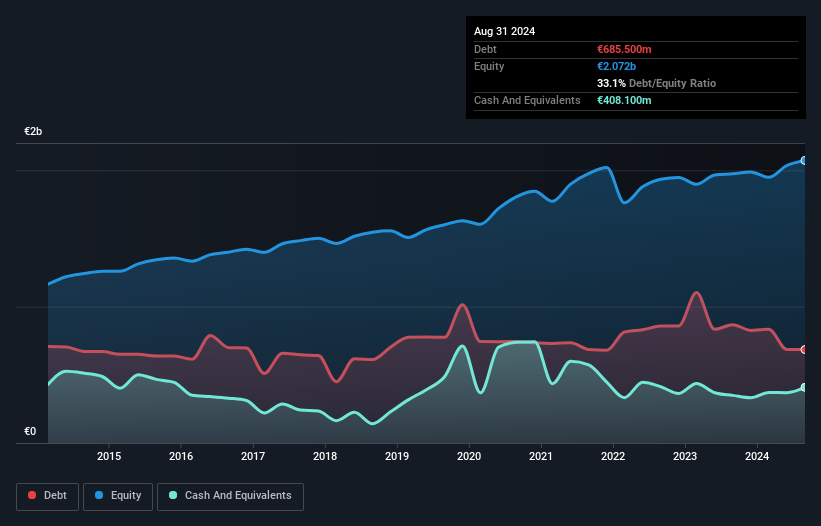- Germany
- /
- Specialty Stores
- /
- XTRA:HBH
These 4 Measures Indicate That HORNBACH Holding KGaA (ETR:HBH) Is Using Debt Reasonably Well

Legendary fund manager Li Lu (who Charlie Munger backed) once said, 'The biggest investment risk is not the volatility of prices, but whether you will suffer a permanent loss of capital.' So it might be obvious that you need to consider debt, when you think about how risky any given stock is, because too much debt can sink a company. Importantly, HORNBACH Holding AG & Co. KGaA (ETR:HBH) does carry debt. But the more important question is: how much risk is that debt creating?
What Risk Does Debt Bring?
Debt and other liabilities become risky for a business when it cannot easily fulfill those obligations, either with free cash flow or by raising capital at an attractive price. Ultimately, if the company can't fulfill its legal obligations to repay debt, shareholders could walk away with nothing. However, a more usual (but still expensive) situation is where a company must dilute shareholders at a cheap share price simply to get debt under control. Of course, debt can be an important tool in businesses, particularly capital heavy businesses. When we examine debt levels, we first consider both cash and debt levels, together.
Check out our latest analysis for HORNBACH Holding KGaA
What Is HORNBACH Holding KGaA's Debt?
You can click the graphic below for the historical numbers, but it shows that HORNBACH Holding KGaA had €685.5m of debt in August 2024, down from €867.9m, one year before. However, it does have €408.1m in cash offsetting this, leading to net debt of about €277.4m.

A Look At HORNBACH Holding KGaA's Liabilities
According to the last reported balance sheet, HORNBACH Holding KGaA had liabilities of €939.8m due within 12 months, and liabilities of €1.45b due beyond 12 months. Offsetting this, it had €408.1m in cash and €99.7m in receivables that were due within 12 months. So its liabilities outweigh the sum of its cash and (near-term) receivables by €1.88b.
Given this deficit is actually higher than the company's market capitalization of €1.38b, we think shareholders really should watch HORNBACH Holding KGaA's debt levels, like a parent watching their child ride a bike for the first time. In the scenario where the company had to clean up its balance sheet quickly, it seems likely shareholders would suffer extensive dilution.
In order to size up a company's debt relative to its earnings, we calculate its net debt divided by its earnings before interest, tax, depreciation, and amortization (EBITDA) and its earnings before interest and tax (EBIT) divided by its interest expense (its interest cover). The advantage of this approach is that we take into account both the absolute quantum of debt (with net debt to EBITDA) and the actual interest expenses associated with that debt (with its interest cover ratio).
While HORNBACH Holding KGaA's low debt to EBITDA ratio of 0.65 suggests only modest use of debt, the fact that EBIT only covered the interest expense by 6.9 times last year does give us pause. So we'd recommend keeping a close eye on the impact financing costs are having on the business. In addition to that, we're happy to report that HORNBACH Holding KGaA has boosted its EBIT by 45%, thus reducing the spectre of future debt repayments. When analysing debt levels, the balance sheet is the obvious place to start. But it is future earnings, more than anything, that will determine HORNBACH Holding KGaA's ability to maintain a healthy balance sheet going forward. So if you want to see what the professionals think, you might find this free report on analyst profit forecasts to be interesting.
Finally, a business needs free cash flow to pay off debt; accounting profits just don't cut it. So it's worth checking how much of that EBIT is backed by free cash flow. During the last three years, HORNBACH Holding KGaA produced sturdy free cash flow equating to 66% of its EBIT, about what we'd expect. This cold hard cash means it can reduce its debt when it wants to.
Our View
When it comes to the balance sheet, the standout positive for HORNBACH Holding KGaA was the fact that it seems able to grow its EBIT confidently. But the other factors we noted above weren't so encouraging. In particular, level of total liabilities gives us cold feet. Looking at all this data makes us feel a little cautious about HORNBACH Holding KGaA's debt levels. While debt does have its upside in higher potential returns, we think shareholders should definitely consider how debt levels might make the stock more risky. Over time, share prices tend to follow earnings per share, so if you're interested in HORNBACH Holding KGaA, you may well want to click here to check an interactive graph of its earnings per share history.
At the end of the day, it's often better to focus on companies that are free from net debt. You can access our special list of such companies (all with a track record of profit growth). It's free.
Valuation is complex, but we're here to simplify it.
Discover if HORNBACH Holding KGaA might be undervalued or overvalued with our detailed analysis, featuring fair value estimates, potential risks, dividends, insider trades, and its financial condition.
Access Free AnalysisHave feedback on this article? Concerned about the content? Get in touch with us directly. Alternatively, email editorial-team (at) simplywallst.com.
This article by Simply Wall St is general in nature. We provide commentary based on historical data and analyst forecasts only using an unbiased methodology and our articles are not intended to be financial advice. It does not constitute a recommendation to buy or sell any stock, and does not take account of your objectives, or your financial situation. We aim to bring you long-term focused analysis driven by fundamental data. Note that our analysis may not factor in the latest price-sensitive company announcements or qualitative material. Simply Wall St has no position in any stocks mentioned.
About XTRA:HBH
HORNBACH Holding KGaA
Through its subsidiaries, develops and operates do-it-yourself (DIY) megastores with garden centers in Germany and other European countries.
Very undervalued with flawless balance sheet.
Similar Companies
Market Insights
Community Narratives




